Enjoying the content on 3QD? Help keep us going by donating now.
Category: Recommended Reading
The Path to American Authoritarianism
Steven Levitsky and Lucan A. Way in Foreign Affairs:
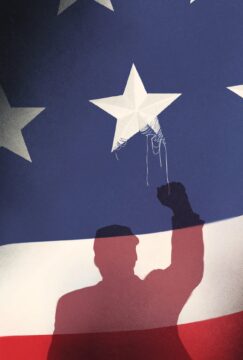 Donald Trump’s first election to the presidency in 2016 triggered an energetic defense of democracy from the American establishment. But his return to office has been met with striking indifference. Many of the politicians, pundits, media figures, and business leaders who viewed Trump as a threat to democracy eight years ago now treat those concerns as overblown—after all, democracy survived his first stint in office. In 2025, worrying about the fate of American democracy has become almost passé.
Donald Trump’s first election to the presidency in 2016 triggered an energetic defense of democracy from the American establishment. But his return to office has been met with striking indifference. Many of the politicians, pundits, media figures, and business leaders who viewed Trump as a threat to democracy eight years ago now treat those concerns as overblown—after all, democracy survived his first stint in office. In 2025, worrying about the fate of American democracy has become almost passé.
The timing of this mood shift could not be worse, for democracy is in greater peril today than at any time in modern U.S. history. America has been backsliding for a decade: between 2014 and 2021, Freedom House’s annual global freedom index, which scores all countries on a scale of zero to 100, downgraded the United States from 92 (tied with France) to 83 (below Argentina and tied with Panama and Romania), where it remains.
The country’s vaunted constitutional checks are failing.
More here.
Enjoying the content on 3QD? Help keep us going by donating now.
Men Actually Crave Romantic Relationships More Than Women Do
Clarissa Brincat in Scientific American:
 Do you think women are more invested in romance than men? Rom-coms and women’s magazines may push this stereotype, but psychological research is increasingly telling a different story: multiple studies have suggested that men may actually place a greater importance on romantic relationships. Now researchers have identified a key behavioral factor that explains this surprising difference.
Do you think women are more invested in romance than men? Rom-coms and women’s magazines may push this stereotype, but psychological research is increasingly telling a different story: multiple studies have suggested that men may actually place a greater importance on romantic relationships. Now researchers have identified a key behavioral factor that explains this surprising difference.
Drawing on more than 50 studies of mixed-gender relationships, researchers at Humboldt University of Berlin, the University of Minnesota and Vrije University Amsterdam proposed that men, compared with women, expect to gain more from being in a romantic relationship and are thus more motivated to find a partner. According to multiple anonymous surveys, men also tend to experience greater mental and physical health benefits from being in a relationship, are less likely to initiate breakups and struggle more with the emotional toll of a breakup, the researchers wrote in Behavioral and Brain Sciences.
Elaine Hoan, who studies social psychology at the University of Toronto, says these observations align with a trend she has seen in her own research: “that single men are typically less happy with their singlehood than single women, even across different Western and Eastern cultural contexts.”
More here.
Enjoying the content on 3QD? Help keep us going by donating now.
George Floyd and Black Lives Matter – A BBC My World special
More here. (Note: In honor of Black History Month, at least one post will be devoted to its 2025 theme of “African Americans and Labor” throughout the month of February)
Enjoying the content on 3QD? Help keep us going by donating now.
The Art of Escape
Michael Carson at The Hudson Review:
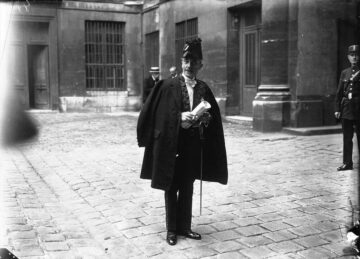 Valéry said we see only through effort after we see for the first time. This is its own sort of trauma. We repeat the seashore of our youth until we die. Yeats did too, with his Irish myths and hopeless love for Maud, his Symbolist trappings and occult obsessions, and all the insecurities of the accomplished autodidact (he once failed to get a teaching job at Trinity College because he couldn’t spell “professor”), but there is a point when we realize art can take us further: It can let us see everything. It is the effort that changes utterly. Owen grasped this as well as Yeats.
Valéry said we see only through effort after we see for the first time. This is its own sort of trauma. We repeat the seashore of our youth until we die. Yeats did too, with his Irish myths and hopeless love for Maud, his Symbolist trappings and occult obsessions, and all the insecurities of the accomplished autodidact (he once failed to get a teaching job at Trinity College because he couldn’t spell “professor”), but there is a point when we realize art can take us further: It can let us see everything. It is the effort that changes utterly. Owen grasped this as well as Yeats.
So, today, now, thinking this through, weighing it, what do we do with this violence? Do we carry it with us like a secret heart? Do we make it into myth so as to share the secret? “All men are dancers and their tread / Goes to the barbarous clangour of a gong,” says Yeats in “Nineteen Hundred and Nineteen.” Some men have eyes that glitter and some go dull to survive.
more here.
Enjoying the content on 3QD? Help keep us going by donating now.
The Lagoon by Janet Frame
Enjoying the content on 3QD? Help keep us going by donating now.
Janet Frame Explored the Edges of Normalcy
Audrey Wollen at The New Yorker:
 “The Edge of the Alphabet” is the third in a sequence of novels published after Frame left the hospital, following “Owls Do Cry,” in 1957, and “Faces in the Water,” in 1961. The novels’ deep-sea dive into her experience, the years of institutionalization, of forcible detachment from the social world, of being written off, made disposable—until she was suddenly holding the pen, writing, writing, writing. They haunt the alleys of the autobiographical, but never fully step onto the recognized thoroughfares of memoir, or even autofiction. Despite clear reference to the events of her life, the novels remain shadowy and irreverent, winding behind the normative façades of storytelling.
“The Edge of the Alphabet” is the third in a sequence of novels published after Frame left the hospital, following “Owls Do Cry,” in 1957, and “Faces in the Water,” in 1961. The novels’ deep-sea dive into her experience, the years of institutionalization, of forcible detachment from the social world, of being written off, made disposable—until she was suddenly holding the pen, writing, writing, writing. They haunt the alleys of the autobiographical, but never fully step onto the recognized thoroughfares of memoir, or even autofiction. Despite clear reference to the events of her life, the novels remain shadowy and irreverent, winding behind the normative façades of storytelling.
The loose trilogy begins with something like the truth, but molded by a stark counterfactual: in “Owls Do Cry,” for example, the protagonist, Daphne, undergoes the lobotomy that Frame herself narrowly avoided. The Withers family, presented first in “Owls Do Cry” and then picked up again in “The Edge of the Alphabet,” refracts Frame and her siblings: Daphne, locked up and deemed insane; her sisters, Chicks and Francie (who dies by falling into the fire pit at their local dump); and her brother, Toby, who struggles with epilepsy, are versions of Frame; her sisters Myrtle and Isabel, who each accidentally died by drowning, years apart; her surviving sister, June, and her brother, George, who was epileptic.
more here.
Enjoying the content on 3QD? Help keep us going by donating now.
Tuesday Poem
Being In Time
Scotland, St. Andrews — cricket chirp of electric watch,
cry of waking gull. A far church sounds a sweet bell seven
times. Quiet. Now the near Presbyterian kirk’s seven, —
………………………….up, up,
………………………….up, up,
………………………….up, up, up,
………….. no going back
………….. cliff-face-climb in front
………….. beneath, the indifferent sea
….. Sitting backwards on a train — rain, low gray fog, Distant cathedral
resolving into stand of poplars. Smoke from a sudden stack disappears
into low cloud. Now stack gone along with hedgerows, houses, and
field, field, field of sheep — the where you have been unknowing,
always unrolling before your eyes.
by Nils Peterson
from 1001 Words
Thinking of Scheherazade
Enjoying the content on 3QD? Help keep us going by donating now.
Monday, February 24, 2025
Chatbots of the Dead
Amy Kurzweil & Daniel Story at Aeon:
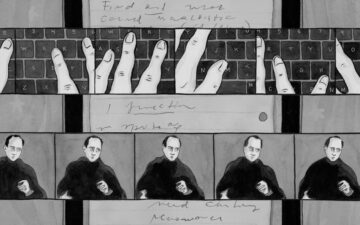 In 2020, the musician and artist Laurie Anderson used a corpus of writing and lyrics from her late husband, Velvet Underground’s co-founder Lou Reed, to create a generative program she interacted with as a creative collaborator. And in 2021, the journalist James Vlahos launched HereAfter AI, an app anyone can use to create interactive chatbots, called ‘life story avatars’, that are based on loved ones’ memories. Today, enterprises in the business of ‘reinventing remembrance’ abound: Life Story AI, Project Infinite Life, Project December – the list goes on.
In 2020, the musician and artist Laurie Anderson used a corpus of writing and lyrics from her late husband, Velvet Underground’s co-founder Lou Reed, to create a generative program she interacted with as a creative collaborator. And in 2021, the journalist James Vlahos launched HereAfter AI, an app anyone can use to create interactive chatbots, called ‘life story avatars’, that are based on loved ones’ memories. Today, enterprises in the business of ‘reinventing remembrance’ abound: Life Story AI, Project Infinite Life, Project December – the list goes on.
These apps and algorithms are part of a growing class of technologies that marry artificial intelligence (AI) with the data that people leave behind. These technologies will become more sophisticated and accessible as the parameters and popularity of large language models increase and as personal data expands into the seeming permanence of the cloud. To some, chatbots of the dead are useful tools that can help us grieve, remember, and reflect on those we’ve lost. To others, they are dehumanising technologies that conjure a dystopian world. They raise ethical questions about consent, ownership, memory and historical accuracy: who should be allowed to create, control or profit from these representations? How do we understand chatbots that seem to misrepresent the past? But for us, the deepest concerns relate to how these bots might affect our relationship to the dead. Are they artificial replacements that merely paper over our grief? Or is there something distinctively valuable about chatting with a simulation of the dead?
More here.
Enjoying the content on 3QD? Help keep us going by donating now.
World History of Sexualities
Merry Wiesner-Hanks & Mathew Kuefler in the Politics & Rights Review:
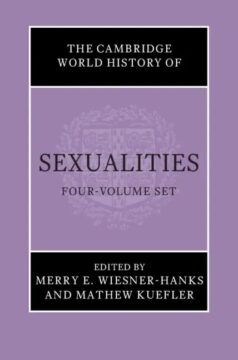 The women’s and gay liberation movements of the 1960s and 70s inspired the first professional historians of sexuality. Many of them specialized in the modern histories of Europe and the United States, and they theorized mainly from the modern Western experience. This is beginning to change: the field has expanded to incorporate premodern histories and histories in all regions of the world, becoming increasingly transhistorical and global.
The women’s and gay liberation movements of the 1960s and 70s inspired the first professional historians of sexuality. Many of them specialized in the modern histories of Europe and the United States, and they theorized mainly from the modern Western experience. This is beginning to change: the field has expanded to incorporate premodern histories and histories in all regions of the world, becoming increasingly transhistorical and global.
World and global history have encouraged broad cross-cultural comparisons and the study of longue durée trends, developments now also seen in the history of sexuality. Historians can now move beyond concentrated specializations in one time and place to create a more comprehensive image of sexuality throughout human history, which is what the Cambridge World History of Sexualities is designed to do.
More here.
Enjoying the content on 3QD? Help keep us going by donating now.
One Step Closer to a ‘Grand Unified Theory of Math’: Geometric Langlands
And also read the accompanying article here.
Enjoying the content on 3QD? Help keep us going by donating now.
There Goes America
The Editors of Project Syndicate:
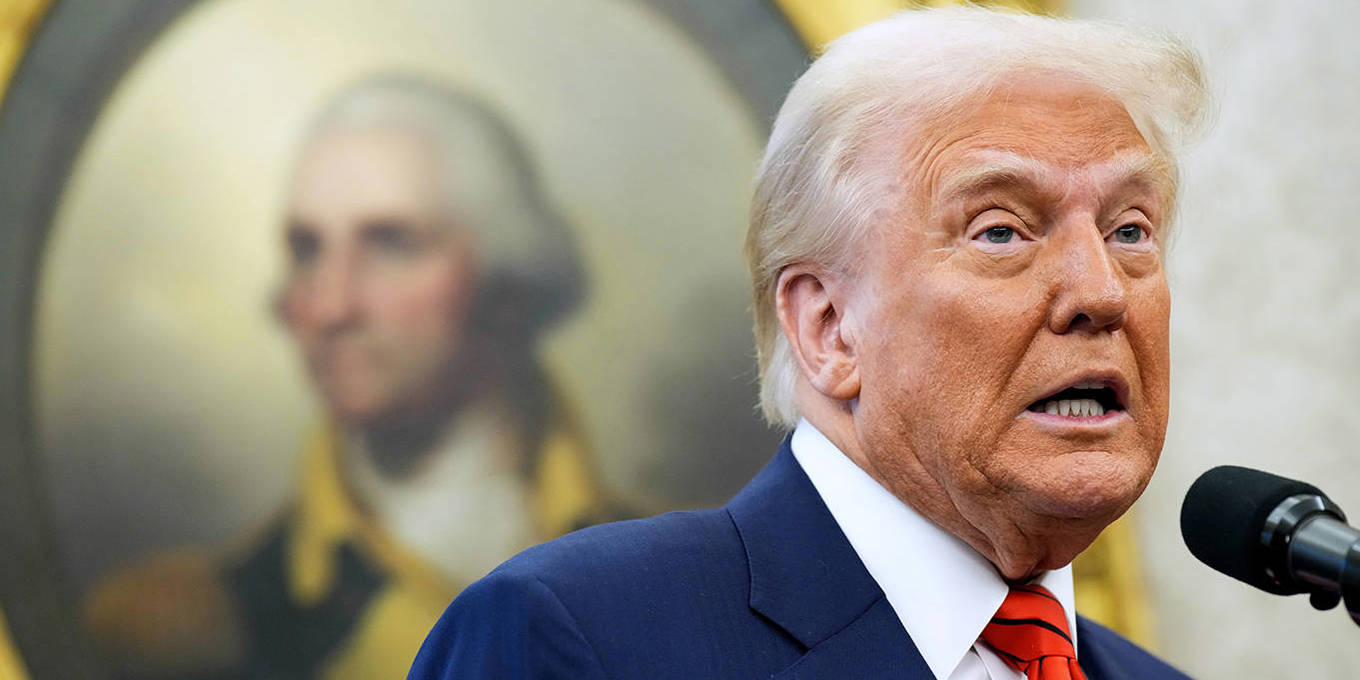 With his unprecedented effort to push the limits of executive power, explains Richard K. Sherwin of New York Law School, Trump is “seeking to alter America’s constitutional framework of checks and balances among co-equal branches of government” – a change that he “lacks constitutional authority to execute.” With the Trump administration indicating that it will not listen to the courts, restoring the US “democratic republic” will require the American people to assert their “original sovereign power, through elections, mass protest, or other forms of collective action.”
With his unprecedented effort to push the limits of executive power, explains Richard K. Sherwin of New York Law School, Trump is “seeking to alter America’s constitutional framework of checks and balances among co-equal branches of government” – a change that he “lacks constitutional authority to execute.” With the Trump administration indicating that it will not listen to the courts, restoring the US “democratic republic” will require the American people to assert their “original sovereign power, through elections, mass protest, or other forms of collective action.”
But effective collective action requires the public to know what is going on, and as J. Bradford DeLong of the University of California, Berkeley, points out, it is difficult to “inform the public and advance public reason” when 10% of Trump’s “performative con-artistry” is “destructive chaos,” and the rest is “mirage.” At the same time, the media is putting too little effort into discerning “which Trump pronouncements are backed by dedicated policymaking teams and bureaucracies with the intent to follow through, and which are not.”
Whatever the details, warns Ian Buruma, Trump’s second presidency will “test, and perhaps destroy, people’s faith in American democracy and its universalist claims.”
More here.
Enjoying the content on 3QD? Help keep us going by donating now.
Explaining Quantum Entanglement and Non-Locality
Enjoying the content on 3QD? Help keep us going by donating now.
These universities have the most retracted scientific articles
Richard Van Noorden in Nature:
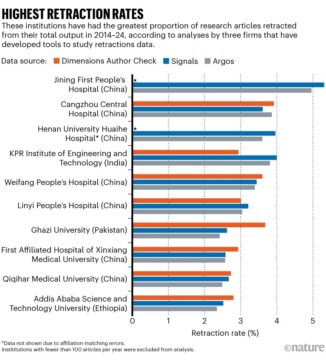 Data on retractions show that they are rare events. Out of 50 million or more articles published over the past decade, for instance, a mere 40,000 or so (fewer than 0.1%) have been retracted, according to the firms’ data sets. But the rise in retraction notices (by which journals announce that a paper is being retracted) is outstripping the growth of published papers — partly because of the rise of paper mills and the growing number of sleuths who spot problems with published articles.
Data on retractions show that they are rare events. Out of 50 million or more articles published over the past decade, for instance, a mere 40,000 or so (fewer than 0.1%) have been retracted, according to the firms’ data sets. But the rise in retraction notices (by which journals announce that a paper is being retracted) is outstripping the growth of published papers — partly because of the rise of paper mills and the growing number of sleuths who spot problems with published articles.
In 2023, as Nature reported, more than 10,000 retraction notices were issued (Nature 624, 479–481; 2023). Most of these were from Hindawi, a now-closed London subsidiary of the publisher Wiley, which found that Hindawi journals were affected by a blizzard of peer-review fraud and sham papers. (Wiley told Nature at the time that it had scaled up its research-integrity teams, put in place more rigorous processes to oversee manuscripts and removed “hundreds” of bad actors, including some guest editors, from its systems). During the past decade, the annual retraction rate — the proportion of published articles in a particular year that have been retracted — has trebled (although fewer retraction notices were issued overall in 2024 than in 2022 or 2023; see ‘A tide of retractions’). The proportion reached around 0.2% for papers published in 2022, and will rise as more articles are withdrawn (see ‘Rates on the rise’).
More here.
Enjoying the content on 3QD? Help keep us going by donating now.
Althea Gibson broke barriers
Larry Schwartz in ESPN:
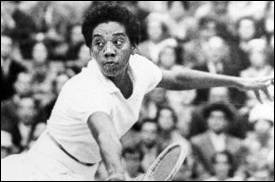 Before Althea Gibson could play — much less win — major tennis tournaments, another opponent had to be defeated. But Gibson had less control against this foe, which went by the name segregation. Jackie Robinson played in the major leagues (1947) before a black was permitted to play tennis at the U.S. National Championships. But cracks soon developed in the lily-white sport. And finally, in 1950, when Gibson was 23 years old, she was permitted to play at the U.S. Nationals, becoming the first black to compete in the tournament.
Before Althea Gibson could play — much less win — major tennis tournaments, another opponent had to be defeated. But Gibson had less control against this foe, which went by the name segregation. Jackie Robinson played in the major leagues (1947) before a black was permitted to play tennis at the U.S. National Championships. But cracks soon developed in the lily-white sport. And finally, in 1950, when Gibson was 23 years old, she was permitted to play at the U.S. Nationals, becoming the first black to compete in the tournament.
She also later cracked the color barrier at Wimbledon.
In 1956, Gibson made history by becoming the first black person to win the French championships. The next year, she made more history by winning Wimbledon and the U.S. Nationals, the first black to win either. She must have liked winning the world’s two most prestigious tournaments, too, because she repeated the accomplishments in 1958.
More here. (Note: In honor of Black History Month, at least one post will be devoted to its 2025 theme of “African Americans and Labor” throughout the month of February)
Enjoying the content on 3QD? Help keep us going by donating now.
How Do You Write an Opera Based on Moby-Dick?
Sophie Haigney interviews Gene Scheer at The Paris Review:
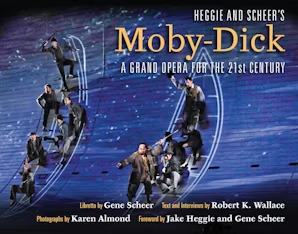 When the composer, Jake Heggie, said to the Dallas Opera, “We want to do Moby-Dick,” the artistic director Jonathan Pell asked, “Is there anything else you’d like to do?” So, yes. It was a daunting prospect, and it took a long time to figure out a way into it. For the first six months of the process, I just read and reread the book, which I hadn’t done since high school—and back then I probably skipped some chapters. I was also reading criticism about it. I was concerned not just with how to cut it down but also with how to really adapt it for the stage. The nature of Moby-Dick, or any novel, is that it’s telling a story. The narrator is very prominent. In the theater, we’re in the business of showing a story. Rather than what the characters are saying, it’s a question of what they’re doing and how the action can bring life to the story. But I could also see the possibilities immediately for the adaptation. There’s so much about Moby-Dick that is operatic—the language, the themes, and the power of the story. Throughout the book, there are these dramatic, incredibly poetic passages that I could imagine being sung, especially if they were distilled down. And the thing about Moby-Dick is that while it is a very long book and one that’s deep and dense, it does have a very compelling adventure story at the center of it. I knew we could exploit that.
When the composer, Jake Heggie, said to the Dallas Opera, “We want to do Moby-Dick,” the artistic director Jonathan Pell asked, “Is there anything else you’d like to do?” So, yes. It was a daunting prospect, and it took a long time to figure out a way into it. For the first six months of the process, I just read and reread the book, which I hadn’t done since high school—and back then I probably skipped some chapters. I was also reading criticism about it. I was concerned not just with how to cut it down but also with how to really adapt it for the stage. The nature of Moby-Dick, or any novel, is that it’s telling a story. The narrator is very prominent. In the theater, we’re in the business of showing a story. Rather than what the characters are saying, it’s a question of what they’re doing and how the action can bring life to the story. But I could also see the possibilities immediately for the adaptation. There’s so much about Moby-Dick that is operatic—the language, the themes, and the power of the story. Throughout the book, there are these dramatic, incredibly poetic passages that I could imagine being sung, especially if they were distilled down. And the thing about Moby-Dick is that while it is a very long book and one that’s deep and dense, it does have a very compelling adventure story at the center of it. I knew we could exploit that.
more here.
Enjoying the content on 3QD? Help keep us going by donating now.
The Travels of Norman Lewis
Nicholas Rankin at Literary Review:
 Norman Lewis (1908–2003) was arguably the finest English travel writer of his generation. Other contenders for the title – Robert Byron, Peter Fleming, Graham Greene, Evelyn Waugh, say – were all Oxford-educated, but Lewis was a product of Enfield’s grammar school and its public library. A devotee of the classics – Herodotus, Suetonius, Chekhov, Turgenev – he was attracted southwards. Federico García Lorca was his favourite poet. He gracefully reconfigured his first book, Spanish Adventure, written at twenty-six, into his last book, The Tomb in Seville, at the age of ninety-four. Just as a matador conceals his sword behind a bright muleta cape, he masked a tragic sensibility with a comic style.
Norman Lewis (1908–2003) was arguably the finest English travel writer of his generation. Other contenders for the title – Robert Byron, Peter Fleming, Graham Greene, Evelyn Waugh, say – were all Oxford-educated, but Lewis was a product of Enfield’s grammar school and its public library. A devotee of the classics – Herodotus, Suetonius, Chekhov, Turgenev – he was attracted southwards. Federico García Lorca was his favourite poet. He gracefully reconfigured his first book, Spanish Adventure, written at twenty-six, into his last book, The Tomb in Seville, at the age of ninety-four. Just as a matador conceals his sword behind a bright muleta cape, he masked a tragic sensibility with a comic style.
This brilliant new anthology, A Quiet Evening, is the latest selection of Lewis’s work edited by John Hatt, who founded Eland Books in 1982. Hatt’s dream was to republish great travel literature in handsome editions. The first classic he reissued was A Dragon Apparent, Lewis’s account of his journeys in Cambodia, Laos and Vietnam, originally published in 1951, before war devastated Indo-China.
more here.
Enjoying the content on 3QD? Help keep us going by donating now.
Sunday, February 23, 2025
How to DOGE USAID
Daniela Gabor in Phenomenal World:
We often hear that the new Trump administration inaugurates the age of technofeudalism. Just look at Elon Mask, pontificating about so-called “Department of Government Efficiency” (DOGE) democracy from the Oval Office while undemocratically occupying the US Treasury payment system. But is the administration simply using bullying as a mode of power, as Adam Tooze recently diagnosed it, destroying institutions without measure or plan?
The smashing of the US Agency for International Development (USAID) makes a good case for both. For American liberals, USAID stands as a beacon of progressive values—a vehicle for delivering essential public investments in sexual and reproductive rights, climate resilience, or the Sustainable Development Goals (SDG) in the global South. The many voices defending it from the DOGE onslaught described it as a force for good, even as, or precisely because, it quietly advances US soft power objectives. This view is widely shared. As Bernie Sanders put it, “Elon Musk, the richest guy in the world, is going after USAID, which feeds the poorest people in the world.”
But this was not smashing without a plan.
More here.
Enjoying the content on 3QD? Help keep us going by donating now.
Speed Up the Breakdown
Quinn Slobodian in the NY Review of Books:
For the last month, the US opinion-making class has stared agog as Elon Musk and his minions have stormed the engine room of the federal government. Young men with smirking profile photos and scandalously thin curriculum vitae have become the shock troops of the so-called Department of Government Efficiency (DOGE). They are strolling through the halls of power, messaging federal staffers en masse to stay home and accessing internal intelligence reports. According to Wired’s reporting, one DOGE staffer who later resigned over his racist social media posts had both read and write access to the Treasury’s payment systems for at least a day. Three years ago, as a sixteen-year old intern, another had been fired by a data-security firm for allegedly leaking information to a competitor. Like the QAnon Shaman at the senate rostrum on January 6, this is Grand Guignol, a spectacle both serious and ridiculous. For the second time in five years, people are forced to ask: can you cosplay a coup?
Buffaloed onlookers have groped for precedent. The tech critic Cory Doctorow has described these men as “broccoli-haired Gen Z brownshirts,” fighting enemy institutions as a sort of Tesla Jugend. The sociologist Ho-Fung Hung suggested they were Red Guards of a Great Github Cultural Revolution, storming the headquarters and confronting the party in the name of a purer reading of the master’s texts. The economist J.W. Mason compared their actions to the dismemberment of the former Soviet state in the 1990s—private looting under foreign supervision. Musk himself referenced a beloved far-right meme when he posted that “not many Spartans are needed to win battles.”
None of the analogies are very persuasive.
More here.
Enjoying the content on 3QD? Help keep us going by donating now.
A Radical New Proposal For How Mind Emerges From Matter
Sally Adee in Noema:
We seem to be entering a new era of cries du coeur to gather more life, including plants, under the umbrella of intelligence. Bookstores these days are heaving with volumes with titles like “The Revolutionary Genius of Plants,” “Planta Sapiens” and “The Light Eaters.”
Their authors are not even at the vanguard anymore. Some boldly go even further, finding behavior they label intelligent in fungi, bacteria, slime molds and paramecia. Even the cells that constitute our bodies are now standing at the velvet ropes, backed by frontier scientists waving evidence of behavior that might qualify as the hallmarks of intelligence if it were observed in an animal.
What on Earth is going on? Should we consider everything to be intelligent now?
There’s some evidence that the question is exactly backward. A small but growing number of philosophers, physicists and developmental biologists say that, instead of continually admitting new creatures into the category of intelligence, the new findings are evidence that there is something catastrophically wrong with the way we understand intelligence itself. And they believe that if we can bring ourselves to dramatically reconsider what we think we know about it, we will end up with a much better concept of how to restabilize the balance between human and nonhuman life amid an ecological omnicrisis that threatens to permanently alter the trajectory of every living thing on Earth.
Enjoying the content on 3QD? Help keep us going by donating now.
